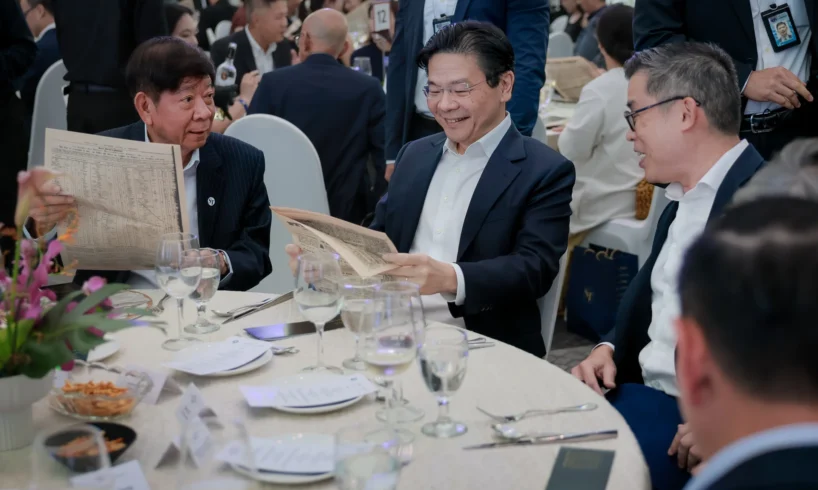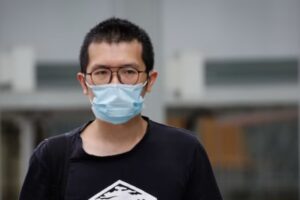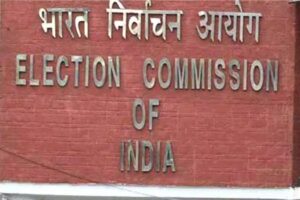
[SINGAPORE] In an age of rapid change, Singapore needs trusted media outlets to help it navigate a complex world, discern fact from falsehood, and build common ground, said Prime Minister Lawrence Wong.
Given this context, The Straits Times will have the government’s “full support and confidence” to fulfil its mission of producing a high-quality publication that informs, educates, connects and holds Singapore society together, he said.
Speaking at a gala dinner on Fiday (July 11) in celebration of ST’s 180th anniversary, PM Wong also said the organisation’s success will not be measured by the size of its profits, but by the trust it earns, its reach and the impact it makes.
ST printed its first edition on July 15, 1845.
PM Wong made three suggestions on how ST can stay relevant in the new media environment: build on its strengths as a trusted anchor for Singaporeans, keep quality at the core and speak to the world with a Singaporean voice.
On becoming a trusted anchor, he noted that reader preferences have become more diverse and fragmented, as the digital environment makes it easy for people to fall into echo chambers, or be fed what algorithms think they want to see.
BT in your inbox
Start and end each day with the latest news stories and analyses delivered straight to your inbox.
“Singapore needs trusted media that continue to present balanced perspectives, surface different points of view, and hold meaningful conversations – so that we can better understand one another and develop a common understanding of the world,” PM Wong said.
While ST’s key strength lies in its deep and consistent coverage of Singapore and South-east Asia, the paper must also remain a “unifying force in helping Singaporeans make sense of complex issues, bridging divides and fostering a shared identity and sense of purpose”, he said.
The news organisation has moved beyond a transactional relationship with readers and towards what its editor, Jaime Ho, described earlier on July 11 as “community-driven journalism”. For example, it has conducted a series of discussions called Conversations with The Straits Times, to get a better understanding of what Singaporeans want.
Ho was one of some 200 people present at the dinner, held at Jewel Changi Airport. Others included SPH Media’s chairman Khaw Boon Wan, chief executive Chan Yeng Kit, and editor-in-chief of the English/Malay/Tamil Media group Wong Wei Kong.
ST is SPH Media’s flagship English daily newspaper. The latest survey findings by market research firm GfK show that SPH Media reaches eight in 10 Singapore residents.
The media trust said in a statement that among Singapore news publishers, SPH Media’s news products have also garnered the highest number of page views.
SPH Media is the nation’s most awarded news organisation by authoritative international associations, including the International News Media Association, World Association of News Publishers and Society of Publishers in Asia.
Also present were Minister for Digital Development and Information Josephine Teo, Senior Minister of State for Digital Development and Information and Health Tan Kiat How, and Leader of the Opposition and Workers’ Party chief Pritam Singh.
On keeping quality at the core of ST’s mission, PM Wong said the paper must continue to anchor public discourse “with clear exposition and reliable facts” in an age of misinformation.
While the temptation will be to chase eyeballs with sensational news, “that’s not the path to building trust”, he said.
Long-form writing and deep-dive analysis can still work to draw loyal audiences, provided that the content is of high quality, insightful and well-crafted, he added.
“Formats may evolve, but quality content never goes out of style. It is not true that people only want short videos or clickbait headlines. Succinct, timely reports will be an important news product,” PM Wong also said.
Delivering all these consistently requires a strong and capable team across editorial, production, technical, and business functions, he said.
“You will need not only professional expertise, but also a clear sense of mission – and the energy and creativity to thrive in a very challenging industry,” he added.
He said ST will have to offer competitive career paths and purposeful job responsibilities to attract resourceful and enterprising young people to join the newsroom.
PM Wong also said that Singapore – a small country navigating a complex and uncertain world – needs strong, credible institutions that can analyse clearly, explain deeply, and advocate confidently for national interests.
ST must continue to fulfil this role, helping readers here and abroad make sense of global trends through a Singapore lens, he said. While Singaporeans can access news from many sources, they do turn to the publication for unique perspectives that reflect the country’s values, interests and place in the world.
PM Wong highlighted that the business model for quality journalism is unfortunately under strain everywhere, which feeds the trend where newsrooms become captive to commercial interests.
“We cannot allow that to happen here in Singapore,” he said. “We do not want our national newspaper to be owned by billionaires with narrow or partisan agendas. Nor do we want public trust in the media to be eroded.”
He reaffirmed the government’s support for public service media to ensure quality journalism remains viable, independent and accountable to Singaporeans. “You have our full confidence and support in this mission,” he told his audience.
PM Wong said ST has “never stood still”, and has become more than just a newspaper, having embraced change and innovation – experimenting with new formats and technologies, adopting digital tools and online platforms, and rethinking how stories are told.
Nevertheless, ST will have to keep adapting its news products and how it reaches and engages with its audiences, as media consumption habits continue to evolve, he said.
The task will not be easy and will involve tough choices, he added, noting that there will be trade-offs to manage, including the risk of cannibalising existing formats, or disrupting longstanding work processes.
On the print product, PM Wong added: “I believe there will still be a place for print, and we should do our best to keep print newspapers viable in Singapore for as long as possible.”
But a decade from now, the physical newspaper may well look quite different from today, in terms of style, tone and length, he added.
“Ultimately, only The Straits Times can make these calls – weighing the opportunities, managing the risks, and evolving in a way that stays true to your mission, while meeting the changing needs of your readers,” PM Wong said.
“The government is not in a position to prescribe the solution, nor will I attempt to do so.” THE STRAITS TIMES





